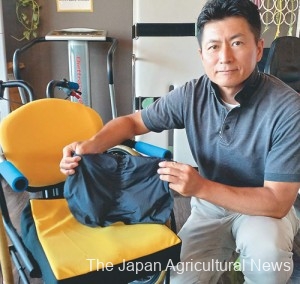GUNMA, Aug. 30 — A nursing and rehabilitation facility operator in Gunma Prefecture has developed a wheelchair cushion using konnayku, a high-fiber, jelly-like food valued for its health benefits.
The prefecture is known as Japan’s top producer of konjac plants, whose corms are used to make konnyaku.
HAPPINESS KEY, a firm in Ota, Gunma Prefecture, adopted konnyaku as a material to create a cushion used on wheelchairs at its nursing and rehabilitation facility Asu Purasu Kea.
The firm is applying for a patent for the product and plans to start marketing the cushion in autumn together with a user-friendly wheelchair that allows users to maintain a good posture.
Keisuke Sekiguchi, representative of the company, has been supporting older people rehabilitate and noticed many of them are experiencing discomfort when using a wheelchair.
It is difficult for older people with decreased muscle strength to keep sitting in a normal wheelchair for a long time, and they tend to develop pressure sores or swallowing disorders.
The firm set on developing a wheelchair using a seating technology that enables users to sit in proper posture by aligning the pelvis.
It created a wheelchair frame whose height can be changed simply with an adjusting lever.
At the same time, the firm was trying to find a way to produce high-quality wheelchair cushions at a low cost, as most of such products currently available are foreign-made and expensive.
The firm focused on konnyaku and, after asking for cooperation by the Gunma Industrial Technology Center, managed to come up with the best mix of konnyaku powder and water to create a material with high viscosity and elasticity fit for a wheelchair cushion.
It is possible to create 30 cushions from a kilogram of konnyaku powder.
“The cushion can be used for at least two years and it is biodegradable because it is made of konnyaku (made from plant fiber),” Sekiguchi said, stressing that the product is environment-friendly.
“We also hope to create new ways of consuming konjac corms to support farmers suffering from the declining prices of konjac corms,” he said.


